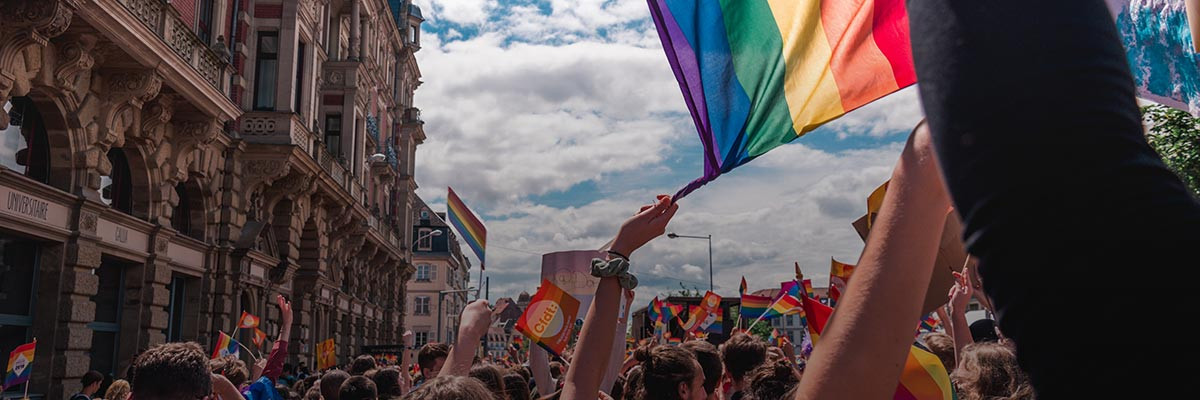
Photo by Margaux Bellotte on Unsplash
In many countries, June is recognized as LGBTI Pride Month—an important recognition for a community, which, despite legal and social progress, still faces hurdles and discrimination.
As we celebrate Pride Month, we recognize the ways that business can help advance LGBTI equality and create more inclusive and equitable workplaces. A leader in the space is Scotiabank, which recently announced a significant expansion of gender affirmation benefits for employees and their families.
In addition to being a founding member of the Partnership for LGBTI Equality (PGLE), Scotiabank has been partnering with BSR since 2016 on its human rights program, beginning with a human rights impact assessment and followed by four years of continuous integration.
We recently connected with Dominic Cole-Morgan, Senior Vice President, Total Rewards, Global Human Resources at Scotiabank to discuss the recent announcement and Scotiabank's broad commitment to human rights.
Scotiabank just made a significant announcement about offering gender affirmation coverage for its employees. Can you share more about this new benefit and how you arrived at the decision?
We’re really proud of this announcement, which expands on our previous standard gender affirmation benefits in order to fill the gaps in coverage so that we can better support trans people in their own personal gender affirmation journey. Coverage up to $50,000 in a lifetime of benefits, including but not limited to electrolysis, rhinoplasty, voice training/surgery, and facial feminization/masculinization, for employees and dependents. Historically, these enhanced benefits have been defined as "cosmetic" and therefore not covered—but we know in our consultations with the trans community how important, and costly, these procedures can be in becoming your true self.
When it comes to why now, when we signed on to the United Nations LGBTI Standards of Conduct for Business in 2019, we committed to meaningful action. We are always looking to review, improve, and enhance our offerings for employees to be as diverse and inclusive as possible.
We recognize that inconsistent progress has been made for the trans community versus other communities, and we knew that we wanted to do what we could to update our offerings accordingly. This sends a signal that if you want to demonstrate you are truly an inclusive workplace, these are the types of things that those organizations can offer.
Announcements like this can raise the bar and push others to follow suit, which ultimately is a really good thing for everyone—what we want is for every company to be doing this, that inclusive coverage becomes the norm.
We’re pleased to have Scotiabank participate in the Partnership for Global LGBTI Equality. What inspired you to get involved in this work, and how did that participation contribute to the decision regarding gender affirmation coverage?
In 2019, we became the first Canadian bank to adopt the United Nations Global LGBTI Standards of Conduct for Business, and we became a founding member of the Partnership for Global LGBTI Equality (PGLE).
The UN Standards and the partnership with PGLE provide a framework to guide and prioritize the activities of our LGBTI inclusion roadmap. Joining PGLE as a founding member provides us with opportunities to operationalize our commitment to the UN Standards, amplify Scotiabank’s unique experience as a Canadian bank with a global footprint in developed and developing markets, and leverage PGLE membership to drive our LGBTI inclusion roadmap, including the new coverage for enhanced gender affirmation benefits for eligible employees and their dependents in Canada and the United States.
Scotiabank has also engaged with BSR on human rights work more broadly over the past few years. What are some key learnings for you from our work together, and how does that tie in with your Diversity, Equity and Inclusion initiatives?
We’ve worked in partnership with BSR to advance global LGBTI inclusion, promote women’s equality, and integrate human rights considerations more broadly across our entire business. Through this partnership, BSR has supported Scotiabank to operationalize our commitment to the Women’s Empowerment Principles, and identify and close gaps in our enterprise policies and processes related to human rights issues such as modern slavery. Leveraging BSR’s expertise combined with our D&I and Social Impact & Sustainability teams has helped to discover synergies and opportunities, and [RN3] make meaningful progress on important issues.
Specific to LGBTI inclusion, and representative of much the work we’ve done with BSR, together we mapped opportunities for Scotiabank to advance LGBTI inclusion aligned to the United Nations Global LGBTI Standards of Conduct for Business. We benchmarked our LGBTI inclusion efforts against leading global companies and highlighted global best practice approaches.
As a result, we developed clear business cases to advance the inclusion of our LGBTI employees, customers, and communities. Scotiabank is currently implementing a three-year LGBTI inclusion action plan as part of our global Diversity and Inclusion strategy and goals, which are focused on:
- Offering employees an environment that is safe, inclusive, and reflective of the communities we serve by promoting fair and equitable treatment for all and prioritizing unconscious bias and anti-racism training
- Providing customers, partners, and suppliers with systems and processes that are free of bias as well as service offerings, marketing, and procurement practices that reflect the diverse communities and cultures we serve
- Leveraging impactful community partnerships that engage employees and advance efforts to eliminate racism and foster economic resilience among Black, Indigenous, and People of Color (BIPOC) communities
As a leader in this space, what advice do you have for other companies considering taking a more action on human rights and LGBTI rights?
The main piece of advice I would have is to consult with your employees. Some of the most meaningful changes we’ve made as an organization came directly from suggestions from our people.
For example, we heard from a mother of an adult trans-identifying individual who was seeking out mental health support for her child even though they were no longer an eligible dependent. While we couldn’t make them an eligible dependent due to tax reasons, it gave us the idea to expand the eligibility of any family member—parent, adult children, or other—in being able to access the funds in employee Wellbeing Accounts, which includes coverage of mental health support. And the gender affirming enhancements were something that we’d heard were critically important from our trans employees.
Getting diverse opinions inherently challenges our own biases or lack of knowledge. While someone not in the community might consider these enhancements to be "cosmetic," for those who are actually living that experience, these are considered life-changing benefits.
If we had only relied on one person’s opinion, we would never hope to achieve a diverse benefits offering that adequately reflects the diversity we have in our employee population. The HR team responsible for making decisions around things like benefits is usually a pretty small team, which means there are perspectives likely missing at the decision-making table. Those consultations are invaluable in ensuring we have the most inclusive perspective possible before enhancing our offerings in an effort to be more inclusive.
Our inclusion strategy for the entire Bank across our global footprint is based on four pillars—Listen, Educate, Act, and Sustain. The gender affirming enhancements are an example of where we are taking Action, but in order for us to get there, we first have to listen to perspectives different than our own and then take accountability for our own education so that we can actually do things that matter and move the dial.
Topics
Collaborative Initiatives
Let’s talk about how BSR can help you to transform your business and achieve your sustainability goals.




